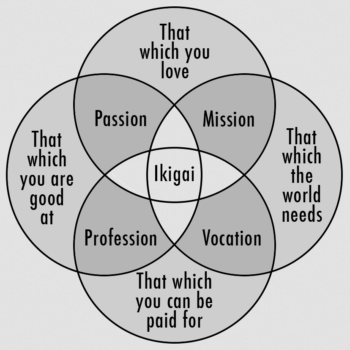There’s a saying that I love and that goes to the heart of the rationale for life coaching.
“If you’re not living, you’re dying.”
It’s rather blunt, I know. However, it speaks perfectly to the fact that we are all imbued with a life force – one that is both incredibly resilient, yet profoundly dependent.
Without a powerful reason for being, that life force, starved of fuel, is easily drained.
Living longer
The Japanese are known for their longevity. Some argue that this has a lot to do with a healthy diet rich in fish, seaweed and antioxidants. There is little doubt that this has an important role to play.
But, perhaps a more compelling reason, is the importance that the Japanese ascribe to the concept of ‘ikigai’, which means having a direction in life, a purpose, or a reason for being.
New Insights life coach training pays particular importance to the role that life coaches can play in helping their clients to identify, clarify and celebrate their purposes in life.
We introduce our trainee life coaches to what we call the 3P technique (Purpose-Passion-Power) that we have specifically designed to achieve this.
Finding your ikigai
The process of identifying your ‘ikigai’ offers another interesting perspective through the introduction of four key questions that you can brainstorm the answers to:
1. What is it that you really love?
2. What is it that you are really good at?
3. What is it that you could be paid for doing?
4. What does the world need?
To bring the process to life it is helpful to draw four intersecting circles to represent your answers to each of these four questions.

Now, consider the intersection between each of the pairs of circles.
In that intersection – or area of overlap – between your answer to questions 1 and 2 lies your passion; between 2 and 3 lies your ideal profession; between 3 and 4 your ideal vocation and between 1 and 4, your personal mission, or how you can leave the world a better place.
The sweet spot
Your ikigai, or reason for being, lies at the ‘sweet spot’ where all four circles overlap, or where your passion, mission, profession and vocation all come together.
Before you attempt this eye opening exercise, spend a few minutes asking yourself what it is right now that gets you out of bed in the morning.
If you are completely honest about this, your answer will probably relate directly to the work that you do to support yourself and your family and/or to bring in an income to survive.
Probably not your day to day work
Sadly, for most people, that does not equate to their ikigai.
Even in Japan, renowned for its sky high work ethic, only about 30% of people consider their day to day work to be their ikigai.
And, in my opinion, that is where life coaching can play such a vital role – helping people identify their ikigai, or reason for being and start to align their day to day lives and priorities accordingly.
Freedom, confidence, growth
The result of doing so is increased personal freedom, self confidence and growth, leading to greater happiness and fulfilment.
Ultimately, of course, this promotes a better world for all of us and our children!


Hi Bill. When I just stared working, someone told me If its to be, its up to me. Over the years I have found many situations that I could apply the above statement. The piont is, in order to help other people, you first need to help yourself. Have a good one.
The Holy Grail.
A superbly inspired blog. Thank you, Bill, for sharpening our awareness of how much deeper and more meaningful our lives become once we find our true purpose. The “sweet spot” is “heaven on earth.”
🙂 🙂
Always so thought provoking…. time to ponder and find that “sweet spot”….thank you Bill. Really enjoyed this blog. 🙂
Thanks Tracey!